Mulberry and Peach (19 page)
Read Mulberry and Peach Online
Authors: Hualing Nieh

Â
8. The horse carries Little Dot to play on the mountains
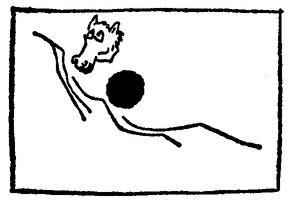
Â
9. Little Dot pats the horse and says she is happy
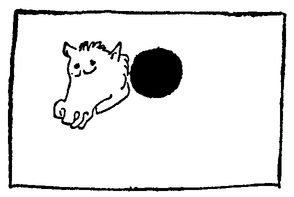
Â
10. Little Dot goes back to her
tatami
mat. Papa and Mama are very angry
tatami
mat. Papa and Mama are very angry

Â
11. The horse tells Little Dot to fly out the window and marry him
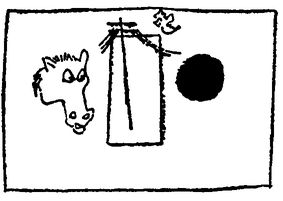
Â
12. Papa kills the horse with an arrow
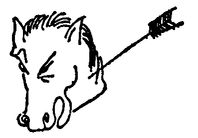
Â
13. The horse's hide is hung up to dry in the sun

Â
14. Little Dot looks out the window
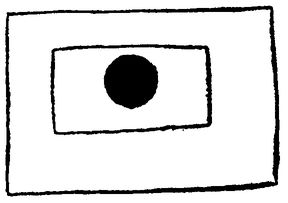
Â
15. The horse's hide rushes to hug Little Dot
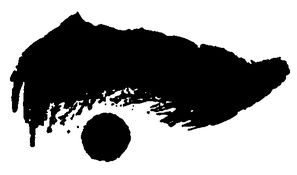
Â
16. Little Dot changes into a silk worm with a horse's head
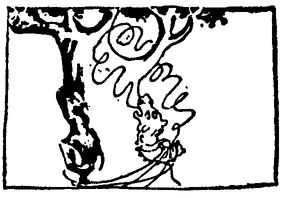
I look out the window at the world outside. The world is covered with dust and cobwebs.
A white cat is dragging its black tail across the opposite rooftop.
Uncle Ts'ai and several friends come into the courtyard. They gesture and move their mouths. I quickly dodge to one side. Sang-wa crawls over to the window. I tell her not to look. However, I return to the window. The little window isn't big enough for two people to look out. I push her head down below the window sill.
Why can those people in the courtyard come and go as they please, Sang-wa asks me. Sometimes she presses her face to the window.
I explain. They can't go wherever they want to, either. There's a wall around the yard. Beyond the wall is the sea. Beyond the sea is the edge of the earth. The earth is a huge attic. The huge attic is divided into millions of little attics, just like ours. I want Sang-wa to understand that the other people in this world live just like us.
Chia-kang lies on his
tatami
mat mumbling to himself. His heart is pounding, it's about to burst. He has heart disease. He wants to die in the attic. He embezzled from public funds only for his family. If he were single, he would be innocent. Even if he has committed a crime, he could get out of the country. He could go to America or South America. Become a foreigner, just like that. His voice grows fainter and fainter. Finally he is just babbling and moving his mouth up and down. Whether his voice is loud or soft doesn't make any difference. Sang-wa and I ignore him completely. Besides, we aren't afraid of speaking in the attic anymore. We haven't used palm writing or writing with kitchen matches to converse for a long time.
tatami
mat mumbling to himself. His heart is pounding, it's about to burst. He has heart disease. He wants to die in the attic. He embezzled from public funds only for his family. If he were single, he would be innocent. Even if he has committed a crime, he could get out of the country. He could go to America or South America. Become a foreigner, just like that. His voice grows fainter and fainter. Finally he is just babbling and moving his mouth up and down. Whether his voice is loud or soft doesn't make any difference. Sang-wa and I ignore him completely. Besides, we aren't afraid of speaking in the attic anymore. We haven't used palm writing or writing with kitchen matches to converse for a long time.
Sang-wa sits on her
tatami
mat singing âThe Girl on the Great Wall' over and over in a small voice.
tatami
mat singing âThe Girl on the Great Wall' over and over in a small voice.
She sings and draws on the newspaper. One whole page is devoted to the important events in the history of modern China beginning with the founding of the Republic 47 years ago on January I when Sun Yat-sen took office as provisional president in Nanking, all the way to the present, to the Communist bombing of the Straits of Taiwan. In between there were the wars against the warlords, the war of resistance against Japan, and the Civil War. Sang-wa scrawls thick, crooked lines of ink all over those important events with her writing brush. Under the lines she draws little circles. Every circle has two eyes and a nose. She makes an ink blot on the thick line. She writes a caption:
Little Dot Plays on the Great Wall
She sings âThe Girl on the Great Wall' over and over.
I tell her not to sing anymore. That song is too old.
She says that it's the first song I taught her to sing. If Papa can talk to himself, then she can sing to herself. She keeps on singing the song.
With the New Year comes the spring
Every house lights red lanterns
Other husbands go home to their families
My husband builds the Great Wall.
Every house lights red lanterns
Other husbands go home to their families
My husband builds the Great Wall.
Suddenly she stops singing. Suddenly Chia-kang stops talking. They turn. They glare at me.
I have put my hand on the window.
I tell them I want to open the window. But I don't open it.
The people in the yard have left. A fan made of palm fronds has been left on the grass.
Â
It's twilight again.
The sun sets behind the attic. We can see only a few rays of red and purple light spreading through the sky. The further the rays of light extend, the fainter they become. Finally they blend with the darkening sky outside the attic window.
There are people in the courtyard.
This time I open the window. Just a crack. Now, not only can I see them, I can also hear their voices.
Uncle Ts'ai throws his head back in laughter. That's a good sign: as soon as I open the window, there is the sound of laughter.
They are speaking in Shanghai dialect. Peking dialect. Nanking dialect. Hu-nan dialect. Different voices. Different dialects. All tell the same story.
They are talking about a ghoul that eats people alive.
Â
It happened on Lin Huo-t'u's thirtieth birthday in a village in the south of Taiwan. He invited three friends to his home to drink
t'ai-pai.
The four of them drank themselves into a stupor.
t'ai-pai.
The four of them drank themselves into a stupor.
Other books
Neighbor Dearest by Penelope Ward
The Kraus Project by Karl Kraus
Staverton by Caidan Trubel
Saved and SAINTified by Laveen, Tiana
How to Romance a Rake by Manda Collins
Lord John and the Private Matter by Diana Gabaldon
A Place Called Home by Dilly Court
Cabin D by Ian Rogers
Pastoralia by George Saunders
Doubles by Nic Brown